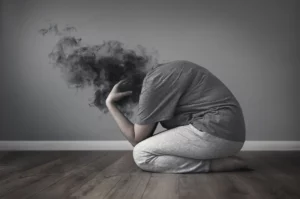 Depression is a common and serious mental health condition that affects millions of people worldwide. Today, we’ll explore what depression is, its symptoms, causes, types, and available treatments.
Depression is a common and serious mental health condition that affects millions of people worldwide. Today, we’ll explore what depression is, its symptoms, causes, types, and available treatments.
Understanding Depression
Depression, often referred to as major depressive disorder, is a mood disorder characterized by persistent feelings of sadness, hopelessness, and a loss of interest in activities once enjoyed. It can affect a person’s thoughts, feelings, and daily life.
Common Symptoms
Symptoms of depression can vary from person to person but often include:
- persistent feelings of sadness,
- loss of interest or pleasure in activities,
- changes in appetite and weight,
- sleep disturbances,
- fatigue,
- feelings of worthlessness or guilt,
- difficulty concentrating.
Physical and Emotional Causes
The exact causes of depression are complex and may involve a combination of genetic, environmental, and psychological factors. Chemical imbalances in the brain, particularly involving neurotransmitters like serotonin, are often implicated.
Types of Depression
There are various types of depression, including:
- Major Depressive Disorder. Characterized by severe and persistent symptoms.
- Persistent Depressive Disorder (Dysthymia). Involves long-term, milder symptoms.
- Bipolar Disorder. Features periods of depression and mania.
- Seasonal Affective Disorder (SAD). Occurs during specific seasons, often in winter.
- Postpartum Depression. Affects new mothers after childbirth.
- Psychotic Depression. Involves severe depression with psychosis.
Risk Factors
Several risk factors can increase the likelihood of developing depression, such as a family history of the disorder, chronic medical conditions, trauma, and a history of substance abuse.
Treatment Options
Effective treatments are available for depression, including:
- Psychotherapy. Talk therapy, such as cognitive-behavioral therapy (CBT) and interpersonal therapy (IPT), can help individuals learn coping strategies and address the underlying causes of their depression.
- Medication. Antidepressant medications, such as selective serotonin reuptake inhibitors (SSRIs), can help correct chemical imbalances in the brain.
- Lifestyle Changes. Regular exercise, a balanced diet, adequate sleep, and stress management can improve depressive symptoms.
- Support Networks. Building a strong support system through family, friends, and support groups can be beneficial.
Seeking Professional Help
If you or someone you know is experiencing symptoms of depression, seeking professional help is crucial. Mental health providers can assess the condition and recommend an appropriate treatment plan.
Depression is a widespread and treatable mental health condition that can affect anyone. Understanding its symptoms, causes, types, and available treatment options is essential for promoting mental well-being. Seeking help and support is the first step toward managing depression and improving one’s quality of life.
Picture Credit: Freepik
